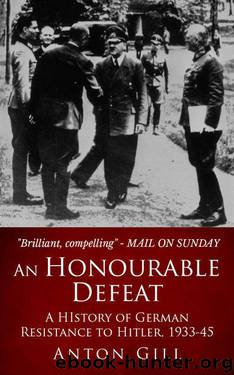An Honourable Defeat: A History of German Resistance to Hitler, 1933-1945 by Anton Gill

Author:Anton Gill [Gill, Anton]
Language: eng
Format: epub, azw3, mobi
Publisher: Endeavour Press
Published: 2014-12-22T08:00:00+00:00
Chapter Eight – Holding On
As soon as he had the news, Sas communicated it to his own authorities and to Colonel Goethals. At midnight he received a lightly coded message from The Hague to enquire if there really were to be no change in the arrangements for ‘the operation on your wife’. Sas told them it would take place in under six hours. But the Dutch did not take the warning seriously, and even the Belgians did not mobilise until 3a.m. The German forces swept over them, driving the British Expeditionary Force, severely depleted, back across the Channel, and decimating the French units which had fought alongside it. General Hoth raced along the north coast of France, while Generals Guderian and Kleist (the latter a cousin of Ewald von Kleist-Schmenzin) headed south and east, smashing through the Ardennes. Paris fell on 14 June, the French capitulated on 22, and hostilities ceased on 25. Hitler ordered that church bells be rung throughout the Reich for a week in celebration. He also created twelve new field marshals — ironically, among them were Leeb and Witzleben — nineteen colonel-generals, and seven generals. Göring now became the first and only ‘Reichsmarschall’ of the Greater German Empire.
The Resistance now entered a long period of abeyance. The phoney war was over, and the new conditions that ensued made it much more difficult to meet, to plan and to carry out any attempt at a coup. Quite apart from anything else, many conspirators were simply kept too busy with their regular duties to contribute; others were posted far away, or to the Front; others decided that now they had to make Germany their priority, and fight for their country rather than against its leaders. Gisevius expresses the dilemma well:
The opposition had to consider its stand in the new situation. A man might have fought bitterly against Hitler’s insane war policy, but now the war was there. How was he to react towards it? As an oppositionist? As a patriot? As a European? Or as none of these, but quite simply as a soldier whose business it was to obey orders?
Let us not forget that totalitarianism and opposition are mutually exclusive political ideas. In a democracy it is possible to practise opposition, but dictatorship permits no antagonists...Opposition is a struggle against an existing regime; it is an attempt to bring about a shift in course or a change in personnel, without directly overthrowing a system...The people of a nation [subjected to evil dictatorship] must take upon their conscience the tremendous burden of devoting all their imagination and zeal to the purely destructive activities of underground work...
As far as peace negotiations were concerned, it soon became clear that any hope of temporising with Britain was gone too (that is, for the Nazis, though the Resistance continued — vainly — to try to talk terms at least). Early in May 1940 the belligerent and ambitious Winston Churchill, leader of a rebel faction within the Conservative Party, staged a coup of his own and forced the waning Chamberlain out of office.
Download
An Honourable Defeat: A History of German Resistance to Hitler, 1933-1945 by Anton Gill.azw3
An Honourable Defeat: A History of German Resistance to Hitler, 1933-1945 by Anton Gill.mobi
This site does not store any files on its server. We only index and link to content provided by other sites. Please contact the content providers to delete copyright contents if any and email us, we'll remove relevant links or contents immediately.
| Belgium | France |
| Germany | Great Britain |
| Greenland | Italy |
| Netherlands | Romania |
| Scandinavia |
Room 212 by Kate Stewart(5121)
The Crown by Robert Lacey(4817)
Endurance: Shackleton's Incredible Voyage by Alfred Lansing(4783)
The Iron Duke by The Iron Duke(4356)
The Rape of Nanking by Iris Chang(4213)
Joan of Arc by Mary Gordon(4110)
Killing England by Bill O'Reilly(4001)
Say Nothing by Patrick Radden Keefe(3985)
I'll Give You the Sun by Jandy Nelson(3447)
Shadow of Night by Deborah Harkness(3368)
Hitler's Monsters by Eric Kurlander(3343)
Mary, Queen of Scots, and the Murder of Lord Darnley by Alison Weir(3210)
Blood and Sand by Alex Von Tunzelmann(3205)
Eleanor & Park by Rainbow Rowell(3173)
Darkest Hour by Anthony McCarten(3133)
Margaret Thatcher: The Autobiography by Thatcher Margaret(3082)
Book of Life by Deborah Harkness(2939)
Red Famine: Stalin's War on Ukraine by Anne Applebaum(2934)
The One Memory of Flora Banks by Emily Barr(2863)
